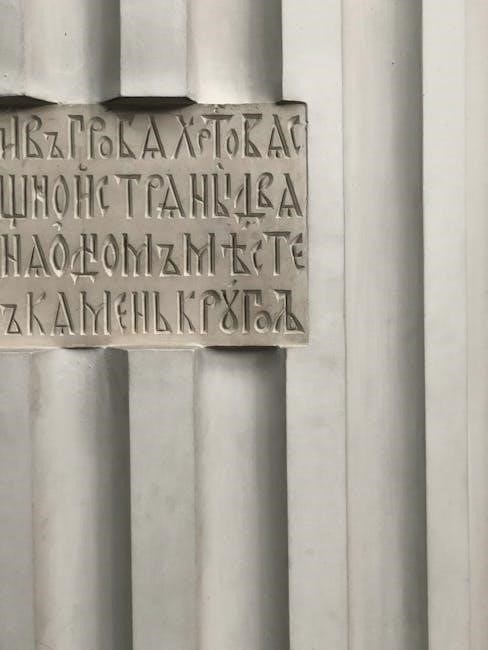MO-PTE refers to the Missouri Pass-Through Entity Tax, applicable to partnerships and S corporations. It requires filing Form MO-PTE annually to elect a state-level tax, helping entities avoid federal deduction limitations. This tax applies to qualifying businesses in Missouri.

Eligibility Criteria
Eligibility for MO-PTE requires the entity to be a partnership or S corporation under Section 143;436. The business must generate qualified income and meet specific thresholds for federal taxable income or QBI calculations, ensuring compliance with state tax regulations.
Who Can File Form MO-PTE
Form MO-PTE is specifically designed for partnerships and S corporations operating in Missouri. These entities must meet the criteria outlined in Section 143.436 of the Missouri Revised Statutes. The filer must be a pass-through entity that generates qualified business income (QBI) and meets the federal taxable income or QBI thresholds. Additionally, fiduciaries of trusts or estates that are members of an electing pass-through entity may also file Form MO-PTE. The entity must annually elect to pay the state-level tax, ensuring compliance with Missouri’s tax regulations. This election allows the entity to avoid federal limitations on deducting state and local taxes (SALT). Importantly, Form MO-PTE does not replace the requirement for partnerships to file Form MO-1065 or for S corporations to file Form MO-1120S. The filing process is mandatory for eligible entities and must be completed accurately to avoid penalties.
Key Definitions for MO-PTE
Pass-Through Entity (PTE): A PTE is a business structure where income is passed through to owners, who report it on their personal tax returns. In Missouri, this includes partnerships and S corporations.
Qualified Business Income (QBI): QBI refers to the net earnings from a trade or business, excluding certain investments and guaranteed payments. It is a critical factor in determining eligibility for the MO-PTE tax.
Affected Business Entity (ABE): An ABE is a partnership or S corporation that elects to pay the Missouri pass-through entity tax. This election must be made annually and is mandatory for filing Form MO-PTE.
Electing Pass-Through Entity: This term describes a PTE that chooses to file Form MO-PTE and pay the state-level tax on behalf of its owners. The election ensures compliance with Missouri tax laws and avoids federal deduction limitations.
Understanding these definitions is essential for compliance with Missouri’s pass-through entity tax regulations. They are outlined in Section 143.436 of the Missouri Revised Statutes and are crucial for accurate filing and reporting.
Missouri Specific Rules and Regulations
Missouri has established specific rules governing the Pass-Through Entity Tax (PTE) to ensure compliance and proper reporting. These regulations are outlined in Section 143.436 of the Missouri Revised Statutes and apply to partnerships and S corporations electing to pay the state-level tax.
- The PTE tax applies to entities with Missouri-sourced income, regardless of the owners’ residency.
- An Affected Business Entity (ABE) must file Form MO-PTE annually to remit the tax.
- The election to become a PTE must be made by the tax year’s end and cannot be revoked once filed.
- Missouri defines “pass-through entity” as any partnership or S corporation subject to federal income taxation.
- The state adheres to federal definitions of Qualified Business Income (QBI) for PTE tax calculations.
These rules ensure uniformity in tax reporting and compliance for pass-through entities operating in Missouri. Adherence to these regulations is critical for accurate filing and avoiding penalties.

Filing Requirements
Filing Form MO-PTE is mandatory for affected business entities, including partnerships and S corporations. The form must be submitted by October 15, 2024, with applicable schedules. Late submissions may result in penalties. Ensure compliance with state-specific instructions.
Necessary Forms for Filing
To complete the MO-PTE filing process, specific forms are required. The primary form is Form MO-PTE, which is the Pass-Through Entity Income Tax Return. This form must be accompanied by Schedule MO-PTE, detailing income, deductions, and credits. Additionally, Schedule K-1 is necessary to report each partner’s or shareholder’s share of income, deductions, and credits. For tax year 2022, all MO-PTE returns and payments must be filed on paper, as e-filing is not available. Forms and instructions can be downloaded from the Missouri Department of Revenue website. Ensure all sections, including Line 2 of the Missouri PTE return, are accurately completed. Proper documentation and adherence to state-specific instructions are crucial for compliance and avoiding penalties.
QBI Calculation for MO-PTE
Calculating Qualified Business Income (QBI) for Missouri Pass-Through Entity Tax (MO-PTE) involves specific steps. QBI includes profits, gains, deductions, and losses from a trade or business, excluding certain items like wages, capital gains, and dividends. Compute QBI as if the entity meets federal requirements under Section 199A. Deduct eligible business expenses to determine net QBI. Apply the 20% deduction on QBI, subject to income thresholds and phase-outs. Additionally, the deduction cannot exceed 50% of W-2 wages paid by the business, ensuring compliance with federal limitations. If applicable, alternative calculations using EBITDA may apply. Ensure all computations align with federal regulations and Missouri-specific adjustments. Accurate QBI calculation is crucial for proper tax reporting and adherence to MO-PTE guidelines.
Affected Business Entities
Affected business entities under the Missouri Pass-Through Entity Tax (MO-PTE) are primarily partnerships and S corporations. These entities are subject to the MO-PTE if they meet specific criteria outlined in Section 143.436 of Missouri state law. To qualify, the business must have a taxable presence in Missouri and generate income that is reportable to the state. Additionally, the entity must elect to pay the pass-through entity tax annually, which is mandatory for partnerships and S corporations that meet the defined thresholds. The election ensures that the entity-level tax is applied, avoiding potential federal deduction limitations. Affected business entities must file Form MO-PTE and report their qualified business income (QBI) as part of the tax calculation. The tax rate aligns with Missouri’s corporate tax rate, and the election must be made annually. This designation is crucial for compliance with state tax regulations and ensures proper reporting of pass-through income.
Electing to Become an Affected Business Entity
To elect to become an affected business entity under the Missouri Pass-Through Entity Tax (MO-PTE), partnerships and S corporations must meet specific criteria. The election is mandatory for entities that qualify as “affected business entities” and must be made annually. This process involves filing Form MO-PTE and checking the designated box to confirm the election. The election ensures the entity is subject to the pass-through entity tax, which is levied at the entity level rather than the individual level. This election is particularly beneficial for entities with qualified business income (QBI) that exceeds federal income thresholds, as it helps mitigate federal deduction limitations. The election must be made by the tax filing deadline, and extensions may apply under certain circumstances. It is important to note that this election does not replace the requirement for partnerships to file Form MO-1065 or for S corporations to file Form MO-1120S. The Missouri Department of Revenue provides detailed instructions and forms to guide entities through the election process. Proper compliance ensures accurate reporting and avoids potential penalties.

Deadlines for Filing MO-PTE
The deadline for filing the Missouri Pass-Through Entity Tax (MO-PTE) return is the 15th day of the 4th month following the close of the tax year. For most entities operating on a calendar year, this means the deadline is April 15th. If the due date falls on a weekend or federal holiday, the deadline is extended to the next business day. Extensions for filing Form MO-PTE are available and typically provide an additional 6 months, aligning with federal extension periods. However, the extension does not defer payment, and any estimated tax must be paid by the original deadline to avoid penalties and interest.
- Standard Deadline: April 15th for calendar-year entities.
- Extended Deadline: October 15th (or the next business day if it falls on a weekend or holiday).
It is crucial to adhere to these deadlines to ensure compliance and avoid late filing penalties. Entities must file Form MO-PTE and remit payment by the applicable deadline to maintain good standing with the Missouri Department of Revenue.

QBI Computation
Qualified Business Income (QBI) computation is a critical step for pass-through entities filing Form MO-PTE. QBI represents the taxpayer’s share of income from a qualified trade or business, excluding certain items like wages, capital gains, and dividends; Missouri follows federal guidelines for QBI calculation, requiring entities to first compute QBI at the federal level before applying state-specific rules.
- Include: Net earnings from a trade or business, excluding wages and guaranteed payments.
- Exclude: Capital gains/losses, dividends, interest, and items not related to the trade or business.
Entities must adjust QBI for items like self-employment tax deductions and retirement contributions. Missouri does not modify federal QBI amounts, ensuring alignment with IRS computations. Accurate QBI calculation is essential for compliance with MO-PTE filing requirements.
Affected Business Entities
Definition and Scope
An Affected Business Entity (ABE) under the Missouri Pass-Through Entity Tax (MO-PTE) is a partnership or S corporation that elects to pay the state-level pass-through entity tax. This election is mandatory for entities filing Form MO-PTE and is tied to specific criteria outlined in Missouri state tax law.
Eligibility and Criteria
ABEs must meet specific conditions to qualify for the MO-PTE election. These include being classified as a partnership or S corporation under federal and state law, having taxable income derived from Missouri sources, and meeting the thresholds for electing the pass-through entity tax. The election is annual and must be made by all owners of the entity.
Composite Filings and Nonresident Owners
ABEs may also include composite filings where nonresident owners are included in the entity’s tax return. This ensures that all owners, regardless of residency, are accounted for in the MO-PTE tax computation. The entity must ensure compliance with Missouri-specific rules for nonresident withholding and reporting.
ABEs play a crucial role in simplifying state tax compliance for pass-through entities and their owners, ensuring proper allocation and reporting of income at both the entity and individual levels.

Extensions for MO-PTE Filing
General Overview of Extensions
Extensions for filing Form MO-PTE are available to pass-through entities needing additional time to complete their Missouri Pass-Through Entity Tax return. The extension period is generally six months from the original filing deadline, aligning with federal extension provisions.
Key Deadlines and Provisions
The standard deadline for filing Form MO-PTE is the 15th day of the fourth month following the end of the tax year, typically April 15 for calendar-year entities. An extension extends this deadline to October 15. Note that this extension applies to both the return and payment, though interest may accrue on unpaid taxes from the original due date.
Federal Extension Impact
If a pass-through entity receives a federal extension, this automatically grants an extension for the Missouri PTE return. However, entities must still file Form MO-PTE by the extended federal deadline or face potential penalties.
Filing Requirements During Extension
During the extension period, entities must ensure accurate and timely filing of Form MO-PTE. Late filing may result in penalties and interest on unpaid taxes. Missouri tax authorities provide detailed instructions for filing under an extension, including specific forms and documentation requirements.
Extensions are a common practice for pass-through entities needing more time to compile necessary documentation, ensuring compliance with state tax regulations.
Forms and Instructions
The Missouri Department of Revenue provides specific forms and instructions for filing the MO-PTE return. The primary form required is Form MO-PTE, Pass-Through Entity Income Tax Return, which must be completed accurately to reflect the entity’s income, deductions, and credits.
Key Forms and Documentation
- Form MO-PTE: This form is used by pass-through entities to report income and calculate the entity-level tax.
- Missouri PTE Worksheet: This worksheet assists in calculating the pass-through entity tax and is often referenced in the filing instructions.
- Schedules and Attachments: Additional schedules may be required to report specific deductions, credits, or adjustments.
Accessing Forms and Instructions
The Missouri Department of Revenue provides downloadable forms and detailed instructions on their official website. Taxpayers can also refer to the MO-PTE Instructions booklet, which includes step-by-step guidance for completing the return.
Important Filing Guidelines
It is crucial to follow the instructions carefully to avoid errors. The instructions clarify concepts such as QBI calculations, affected business entities, and elective provisions. Taxpayers are encouraged to consult the official resources to ensure compliance with state-specific requirements.
For tax year 2022, all MO-PTE returns and payments must be filed on paper, as e-filing is not available. Printable forms and instructions can be found on the Missouri Department of Revenue’s website.
Adhering to the provided forms and instructions ensures accurate and timely filing of the MO-PTE return.

State-Specific Filing Instructions
Missouri requires pass-through entities to follow specific filing instructions for the MO-PTE return. For tax year 2022, all MO-PTE returns and payments must be filed on paper, as e-filing is not available. Taxpayers can find printable forms and instructions on the Missouri Department of Revenue’s website.
Key Filing Requirements
- Form MO-PTE: This form must be completed and submitted with all required schedules and attachments.
- Deadlines: The filing deadline is the 15th day of the fourth month following the end of the tax year. Extensions may be granted, but specific conditions apply.
- Affected Business Entity Election: Entities must check the “Electing to become an Affected Business Entity” box on the form to activate the PTE return.
Additional Instructions
Missouri-specific instructions include completing the Missouri PTE Worksheet to calculate the pass-through entity tax. Taxpayers should refer to the MO-PTE Instructions booklet for detailed guidance on reporting income, deductions, and credits.
For partnerships and S corporations, the election to become an affected business entity must be made annually. The Missouri Department of Revenue provides step-by-step instructions for filing Form MO-PTE, ensuring compliance with state-specific regulations.
It is essential to carefully follow these instructions to avoid filing errors and ensure timely processing of the return.

Compliance with Federal Regulations
Missouri’s pass-through entity tax (MO-PTE) is designed to align with federal tax regulations, ensuring compliance and minimizing conflicts. The IRS guidelines for pass-through entities, such as partnerships and S corporations, are foundational to Missouri’s framework. For instance, the calculation of Qualified Business Income (QBI) under federal law directly influences how QBI is determined for Missouri purposes. Taxpayers must ensure that federal elections, such as the Section 179 deduction or bonus depreciation, are appropriately reflected in their MO-PTE filings.
Federal tax deductions and credits, where applicable, are generally allowed in Missouri, provided they comply with state-specific rules. However, certain federal provisions may require adjustments to conform to Missouri law. The Missouri Department of Revenue encourages taxpayers to consult both federal and state guidelines to ensure accurate reporting.
Compliance with federal regulations also extends to the electing pass-through entity status. Entities must adhere to federal definitions and requirements when making this election, as Missouri’s rules mirror federal standards in this regard. By aligning with federal regulations, Missouri simplifies the filing process for pass-through entities while maintaining state-specific tax obligations.

Common Filing Mistakes
When filing Form MO-PTE, several common mistakes can lead to delays or penalties. One of the most frequent errors is missing the filing deadline, as Missouri has specific due dates for pass-through entity returns. Taxpayers must ensure they submit their returns by the required date, which may differ from federal deadlines. Another common mistake is incorrect entity classification, where partnerships or S corporations misidentify themselves, leading to processing issues.
Failure to report all sources of income accurately is another oversight. Taxpayers must include all applicable income, deductions, and credits to avoid discrepancies with federal returns. Additionally, miscalculating Qualified Business Income (QBI) is a frequent error, as incorrect thresholds or deductions can lead to inaccuracies in the final tax liability.
A common oversight is forgetting to elect the Affected Business Entity (ABE) status, which is mandatory for PTE returns. Taxpayers must check the appropriate box on the form to activate this election. Lastly, not seeking professional assistance for complex filings can result in errors, especially for entities with multiple partners or intricate income structures. Consulting a tax professional is highly recommended to avoid these pitfalls.
Tips for Accurate Filing
Accurate filing of Form MO-PTE requires careful attention to detail and adherence to Missouri state guidelines. First, ensure you understand the eligibility criteria and confirm that your entity qualifies as a pass-through entity under Missouri law. Always use the most recent forms and instructions, as outdated versions may lead to errors or rejected submissions.
Double-check deadlines and file on time to avoid penalties. For tax year 2022, returns must be submitted on paper, as e-filing is unavailable. Additionally, calculate Qualified Business Income (QBI) accurately, ensuring compliance with federal and state thresholds. Consult the Missouri Department of Revenue’s resources for guidance on QBI computation.
Electing to become an Affected Business Entity (ABE) is mandatory for PTE returns, so ensure this box is checked on the form. Keep all supporting documents, such as partnership agreements and financial statements, organized and readily available for reference. Finally, seek professional assistance if unsure about any aspect of the filing process, especially for complex entity structures or high-income scenarios.
By following these tips, filers can minimize errors and ensure compliance with Missouri’s pass-through entity tax requirements.

Impact on Partnerships and S Corporations
The Missouri Pass-Through Entity Tax (MO-PTE) significantly impacts partnerships and S corporations by allowing them to elect an entity-level state tax. This election helps these entities avoid federal deduction limitations on state taxes. Partnerships and S corporations must file Form MO-PTE annually to comply with Missouri’s tax requirements.
For tax year 2022, partnerships and S corporations must submit returns on paper, as e-filing is not available. The filing process requires accurate calculation of Qualified Business Income (QBI) and adherence to federal and state income thresholds. Fiduciaries of trusts or estates that are part of an electing pass-through entity must also comply with these regulations.
The MO-PTE election ensures that partnerships and S corporations meet state tax obligations while maintaining federal compliance. Proper filing and adherence to deadlines are crucial to avoid penalties and ensure accurate tax reporting;
